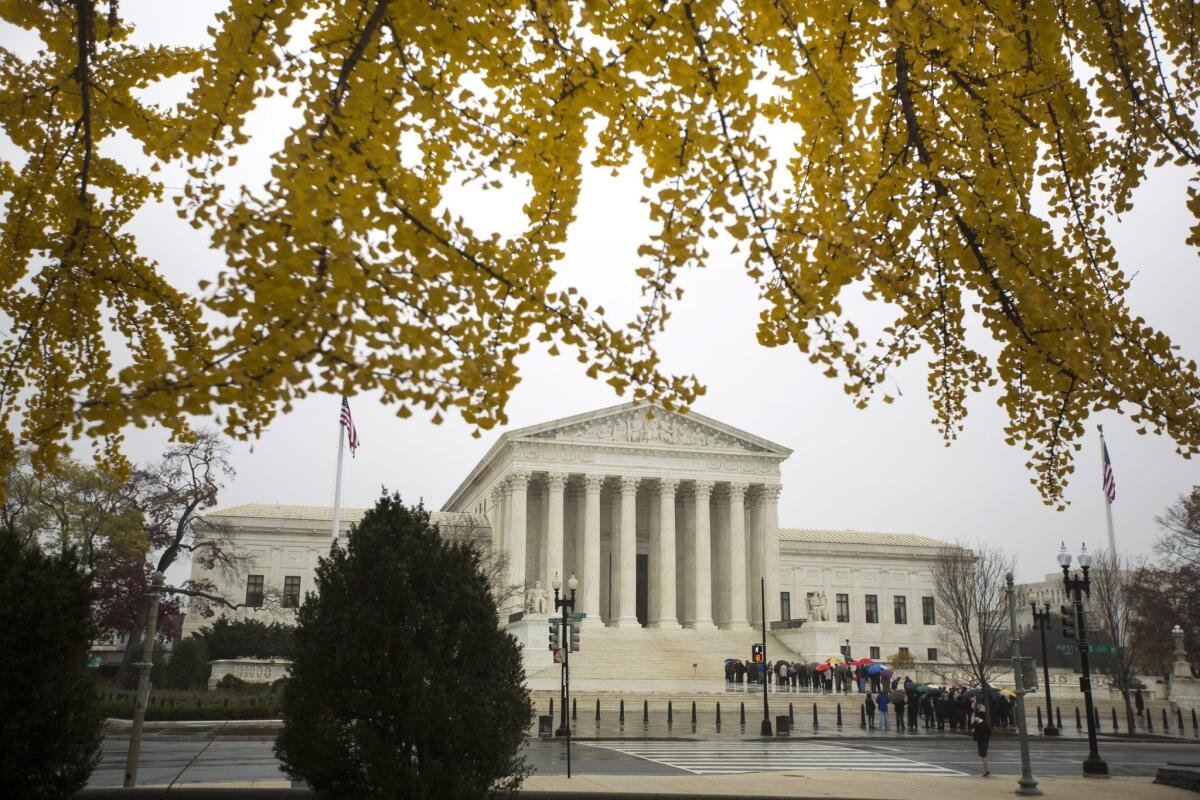Opinion: Obama wins small but crucial decision in court fight over immigration

The Supreme Court on Tuesday denied a request by 26 states to extend a deadline for filing briefs in the challenge to President Obama’s use of executive actions to defer deportations, which means the court could hear the case this term.
- Share via
It’s beginning to look more likely that the U.S. Supreme Court will consider the Obama administration’s appeal of a ruling that has barred the government from implementing his executive actions expanding the pool of people eligible for deferred action on deportations.
In a little-noted decision Tuesday, the Supreme Court rejected a request by Texas and 25 other states to extend the deadline for filing briefs in their challenge to the executive actions. They had sought a Jan. 20 deadline, which would have made it unlikely the court could act before the end of the current term. Instead, the court set a Dec. 29 deadline for those briefs, which shifts the calendar forward enough to allow a hearing in January and, if the court accepts the case, a decision by summertime.
And that, of course, would make immigration a prime topic for the fall presidential and congressional elections. As if it’s not a hot enough topic already.
The issue in the case is Obama’s decision in November 2014 to expand the Deferred Action for Childhood Arrivals program by loosening birth year and date of arrival restrictions, add Deferred Action for Parents of Americans and Lawful Permanent Residents (DAPA) exceptions, and let the parents apply for work permits. To qualify, parents must have lived in the country for at least five years and pass background checks.
Advocates and analysts vary in their estimates, but it is believed that the moves would give breathing room to at least 4 million of the more than 11 million people currently living in the U.S. without permission.
What to do with the 11 million or so people here illegally is a thorny political and moral question, and it has helped propel the presidential candidacy of Donald Trump while simultaneously exposing an ugly underside of American politics. Despite assertions from Trump et al. that those here illegally should be summarily deported, it is neither feasible (the cost alone would be prohibitive) nor wise to do so given the deep impacts on families, businesses, and communities.
The best solution is legislative -- comprehensive immigration reform that addresses the status of those already here while stiffening border protections and tracking those who enter on visas to ensure they leave when they are supposed to. As it is, the median length of residence for undocumented immigrants is more than 12 years, and nearly two-thirds of Americans think their undocumented neighbors ought to be able to follow a path to citizenship.
Given that, it makes sense for the government to prioritize who it targets for deportation, focusing first on those who pose threats to national security or public safety. That’s what Obama’s executive actions would do. The states that sued to halt the executive actions argue that Obama exceeded his authority under the Constitution, but the language of the Immigration and Nationality Act and court rulings make it clear that Obama was within his authority.
Congress intended to leave it to the executive branch to determine who to pursue for deportation, and gave the government the ability to let those against whom it has deferred deportation get jobs (which, when you think about it, is preferable to forcing them to wallow in poverty). If the folks who oppose Obama’s actions really want to limit his power, then they should be petitioning Congress to finally get around to that comprehensive immigration reform.
But that won’t happen. House Speaker Paul D. Ryan (R-Wis.) already ruled it out, embracing the conservatives’ specious argument that it makes no sense to address the law because they don’t trust Obama to enforce it. In reality, it’s a good issue for the right to rail about and fire up the base in congressional districts. But were they to act and force the deportations of even more folks than the Obama administration is deporting, they would lose support from a wide range of voters key to placing a Republican in the White House. It’s better for them politically to leave those 11 million people twisting in the wind.
Which is why it is good that the Supreme Court will have an opportunity to look at the case in the current term. Of course, if the court rejects the administration’s appeal, the U.S. 5th Circuit Court of Appeals’ ruling stands, which would effectively kill the deferred action programs. But it wouldn’t compel the administration to deport those folks. It would just extend the uncertainty in the lives of the undocumented.
If the court takes the case, it’s unclear how it would ultimately rule. But the case history on the issue suggests that the administration ought to prevail. And if that’s the case, the sooner the government can get on with the DACA and DAPA relief, the better for millions of our neighbors.
Follow Scott Martelle on Twitter @smartelle.
More to Read
A cure for the common opinion
Get thought-provoking perspectives with our weekly newsletter.
You may occasionally receive promotional content from the Los Angeles Times.







